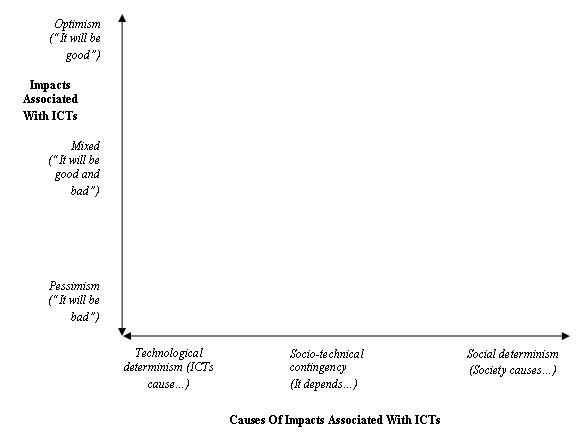
Date: 2024-12-26 Page is: DBtxt003.php txt00004847
Economics
Systemic Dysfunction
Development Informatics Research Must Stop Ignoring ICT’s Downsides
Burgess COMMENTARY
A agree very much with Richard Heek on this matter, but the issue described applies throughout the systems of metrics and evaluation being used in almost all aspects of socio-economic activity.
In the 1950s it was pretty clear that nuclear science was very interesting and important. There were two tracks ... one that gave the world more and more powerful nuclear bombs and one that gave the world nuclear power.
But the really big issue is the terrible trio of dangerous metrics: (1) money profit for business; (2) stock prices for investors; and, (3) GDP growth for investors. These metrics ignore the 'externalities' that are now more serious for people, place and planet than at any time in history.
Why is it that every organization in the world is doing money based accountancy, and in the case of business, incredible internal analytics about contribution to profit, and there is almost no granular analytic accounting for the performance as it relates to a place? In my view this is ridiculous, but very convenient for the investor class whose wealth is related to money profit of the business which does well when there is GDP growth.
The metrics we use are inadequate. The fact that (1) people (other than the investor class) are getting stripped of the modest wealth they may have, (2) that families are seeing their quality of life decline, (3) that the place (community) is losing its economic viability and (4) the planet is being compromised with depletion of its resources together with solid waste pollution, water pollution and air pollution. do not feature in the metrics that are routinely used in the financial and economic press.
A huge amount of reform is needed, and I do not see much leadership interest in taking the important steps needed. Maybe it is becoming a 'talking point' but action seems to be off the table.
Peter Burgess TrueValueMetrics
Peter Burgess
Development Informatics Research Must Stop Ignoring ICT’s Downsides
The dominant narrative within ICT4D associates digital technologies with positive impacts, and has tended to underplay negative impacts. What are the implications for development informatics research?

There has been a recent cluster of global evidence about negative impacts:
- Economic: online retail models are precipitating closure of high street shops. This may be more economically efficient but it is also more ‘efficient’ in terms of employment numbers, it erodes both the sense and reality of community, and large ICT-based firms have been adept at avoiding paying corporation tax. (See attached ‘thank you’ note posted by staff of closed UK photographic retail chain, Jessops.)
- Political: the excitement of the Arab Spring and its supposed twitter revolutions has given way to a situation in which the autocrats have colonised cyberspace. Moving on from the simplicities of blocking and filtering, regimes are now monitoring online communications in order to identify and then arrest, intimidate or attack opponents. Paid commentators are spreading misinformation and pro-regime messages.
- Military: killing by drone is on the increase as are the concerns about autonomy, civil use, and accountability. It is now possible to manufacture your own gun using a 3D-printer. An undeclared cyberwar is already underway between global powers.
- Social: ICTs have propelled a hypersexualisation of young people and pornification of sexual relations.

Unless we adopt an extreme perspective, we can recognise that in terms of impacts, it would have been equally easy to pull out a set of positive evidence about ICT. But it is positive and negative together that tell the whole story. And in terms of causes, there is no simple relationship between the technology and the impacts identified above but, instead, a socio-technical foundation.
This leads to a number of implications for the academic field of development informatics:
- Balance: are we balanced enough in terms of the impacts we associate with ICTs in our work? Pushing a largely positive narrative can have the effect of making our work seem like hype; a relentless monotone buzz to which those working in development become habituated, and start to ignore.
- Preparation: are the policy makers and practitioners who use our work prepared for what’s coming? Development informatics research needs to engage with the negative impacts, providing research users with an understanding of those impacts and, where possible, some strategies for amelioration.
- Analytical Tools: do we understand what is behind these ICT trajectories? ICTs are not the direct cause of the impacts outlined above; they are an enabler of particular economic and political interests. Development informatics needs to ask the age-old question: cui bono? Who benefits when high street shops close? Who benefits from cyber-repression? Who benefits from printed guns? Who benefits from pornography? Cui bono is answered by the analytical tools of political economy. We need to be answering those questions and using these tools a whole lot more in development informatics.
- Advocacy: how do we engage with ICT4D innovation trajectories? Even as it becomes more open and more decentralised, the trajectory of innovation can still be shaped by debate, by advocacy and by activism. Development informatics has always been an engaged area of academic endeavour, not stuck in the ivory tower. We have often worked with those seeking to deliver the positive impacts of ICT4D. The challenge now is to work more with those seeking to avoid the negative impacts of ICT4D.